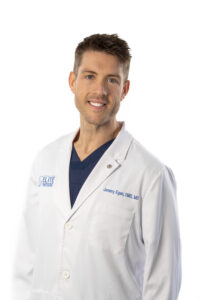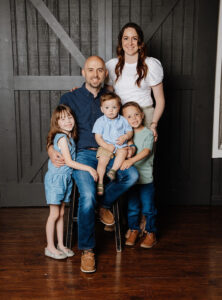Get to know our team!
Dr. Jeremy Egan, DMD, MD – Oral & Maxillofacial Surgeon

A Surgeon Who Treats You Like Family
Dr. Jeremy Egan isn’t just an oral surgeon—he’s a dual-degree doctor (DMD and MD) who believes your surgical experience should feel safe, comfortable and even inspiring. After earning his Doctor of Dental Medicine and Medical Doctorate, Dr. Egan completed a rigorous oral and maxillofacial surgery residency, where he mastered the art of dental implants, full-arch reconstruction, bone grafting and facial trauma care. He’s trained to provide IV sedation and general anesthesia, so you can sleep through surgery knowing a physician is at your side.
Passion for Precision and People
Patients often remark on Dr. Egan’s calm confidence and dry sense of humor. He brings meticulous attention to detail into the operating room and “unreasonable hospitality” into the rest of the office. To him, surgery is about more than fixing broken jaws or taking out teeth—it’s about restoring confidence and dignity. That’s why he offers same-day consultations, shares his cell phone number for post-op concerns, and makes sure every patient feels heard and respected.
Beyond the Office
Away from the clinic, Dr. Egan is a father of three, husband to Katie Egan, and a former athlete who is passionate about fitness. His personal transformation fuels his commitment to helping patients regain their own health and vitality. He’s active in community outreach programs, supports cancer awareness and is always looking for ways to give back to the Tulsa and OKC communities he serves.
“I built Elite OMFS on the belief that world-class surgery and heartfelt hospitality can—and should—coexist. My goal is to change lives, one smile at a time.” – Dr. Egan
If you’d like to meet Dr. Egan and discuss your oral surgery needs, please call 918-395-8305 or schedule a consultation online.
Dr. Trevor Paskett, DMD, MD – Oral & Maxillofacial Surgeon

Expertise You Can Trust
Dr. Trevor Paskett joined Elite Oral & Maxillofacial Surgery of Oklahoma to help expand our vision of surgical excellence and exceptional patient care. Like Dr. Egan, he holds both a Doctor of Dental Medicine and a Medical Doctorate, along with advanced training in anesthesia and maxillofacial surgery. Dr. Paskett is skilled in wisdom teeth removal, dental implants, bone grafting, corrective jaw surgery and oral pathology. His dual-degree background means he understands the connection between oral health and your overall wellbeing.
Compassionate and Thorough
Patients appreciate Dr. Paskett’s warm bedside manner and willingness to answer questions until you feel fully informed. He is known for taking the time to explain procedures in everyday language and for following up personally after surgery. Whether you need a simple extraction or a complex full-arch reconstruction, Dr. Paskett approaches each case with the same level of care and precision.
A Commitment to Community
Raised in the Midwest, Dr. Paskett values community and family. He’s committed to serving the residents of Edmond, Yukon and surrounding areas by bringing advanced surgical services closer to home. Outside of work, he enjoys the outdoors, spending time with his family and volunteering at local health fairs and school events.
“Every patient deserves to be treated like I would treat my own family—with honesty, kindness and the best surgical care available.” – Dr. Paskett
To schedule an appointment with Dr. Paskett at our OKC location, call 405-256-3446 or request a consultation online.
What is an Oral and Maxillofacial Surgeon?
What is an oral and maxillofacial surgeon?
An oral and maxillofacial surgeon is a specialist who diagnoses and treats a wide spectrum of diseases, injuries, and defects in the head, neck, face, jaws, and the hard and soft tissues of the oral (mouth) and maxillofacial (jaws and face) region.
Is an oral and maxillofacial surgeon a medical doctor?
Some oral and maxillofacial surgeons earn a medical degree (MD) in addition to their dental qualifications, but it's not a requirement for all practitioners in the field.
What type of training does an oral and maxillofacial surgeon have?
An oral and maxillofacial surgeon typically completes:
- 4 years of undergraduate education
- 4 years of dental school to earn a Doctor of Dental Surgery (DDS) or Doctor of Dental Medicine (DMD) degree
- A 4-to-6-year surgical residency program, which may include medical education and the option to complete a medical degree (MD) concurrently
- Some may also complete fellowships in sub-specialty areas.
What conditions does an oral and maxillofacial surgeon treat?
These specialists treat various conditions, including impacted teeth, dental implants, facial pain, facial injuries, TMJ disorders, and oral cancer, among others.
What types of surgeries do oral and maxillofacial surgeons perform?
They perform a range of surgeries, from minor procedures like tooth extractions to complex surgeries involving facial reconstruction or cosmetic surgery.
How do oral and maxillofacial surgeons work with other healthcare professionals?
They often collaborate with dentists, orthodontists, ENTs, and plastic surgeons, providing comprehensive care for conditions affecting the oral and maxillofacial region.
When should I be referred to an oral and maxillofacial surgeon?
Referrals are typically made for complex dental extractions, implant placement, orthognathic surgery, trauma surgery, or cancer-related procedures.
What is the difference between an oral surgeon and a general dentist?
An oral surgeon has additional specialized training and experience in surgical procedures involving the mouth, face, and jaws beyond what is taught in general dental education.
How do I know if my oral surgeon is qualified?
You can inquire about their education, residency, board certification, and any additional training. It's also appropriate to ask about their experience with the specific procedure you need.
What is the typical recovery time for procedures performed by oral and maxillofacial surgeons?
Recovery time varies significantly depending on the procedure's complexity, with some requiring only a few days and others necessitating weeks or months for full recovery.
